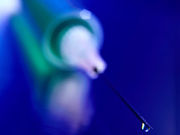Reduced cleavage of high-molecular-weight kininogen and reduction in attacks of angioedema
THURSDAY, Feb. 23, 2017 (HealthDay News) — For patients with hereditary angioedema with C1 inhibitor deficiency, the new kallikrein inhibitor lanadelumab is associated with reduced cleavage of high-molecular-weight kininogen and fewer angioedema attacks, according to a study published in the Feb. 23 issue of the New England Journal of Medicine.
Aleena Banerji, M.D., from Massachusetts General Hospital in Boston, and colleagues conducted a phase 1b trial involving patients with hereditary angioedema with C1 inhibitor deficiency. Participants were randomized to receive lanadelumab (24 patients) or placebo (13 patients) in two administrations 14 days apart with a total dose of 30, 100, 300, or 400 mg.
The researchers observed no discontinuations due to adverse events, serious adverse events, or deaths among patients receiving lanadelumab. There were dose-proportional increases in lanadelumab serum concentrations, with a mean elimination half-life of about two weeks. At a dose of 300 or 400 mg, lanadelumab reduced cleavage of high-molecular-weight kininogen in plasma to levels approaching that of patients without hereditary angioedema with C1 inhibitor deficiency. The 300-mg and 400-mg groups had 100 and 88 percent fewer attacks, respectively, from day eight to day 50 than the placebo group. Twenty-seven percent of patients in the placebo group, and 100 and 82 percent of those in the 300-mg and 400-mg groups, respectively, were attack-free.
“In this small trial, administration of lanadelumab to patients with hereditary angioedema with C1 inhibitor deficiency reduced cleavage of high-molecular-weight kininogen and attacks of angioedema,” the authors write.
Several authors disclosed financial ties to pharmaceutical companies, including Dyax, which manufacturers lanadelumab and funded the study.
Copyright © 2017 HealthDay. All rights reserved.








